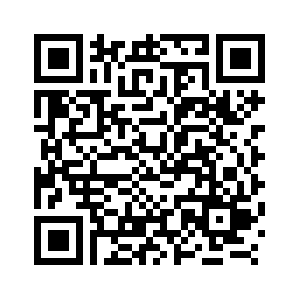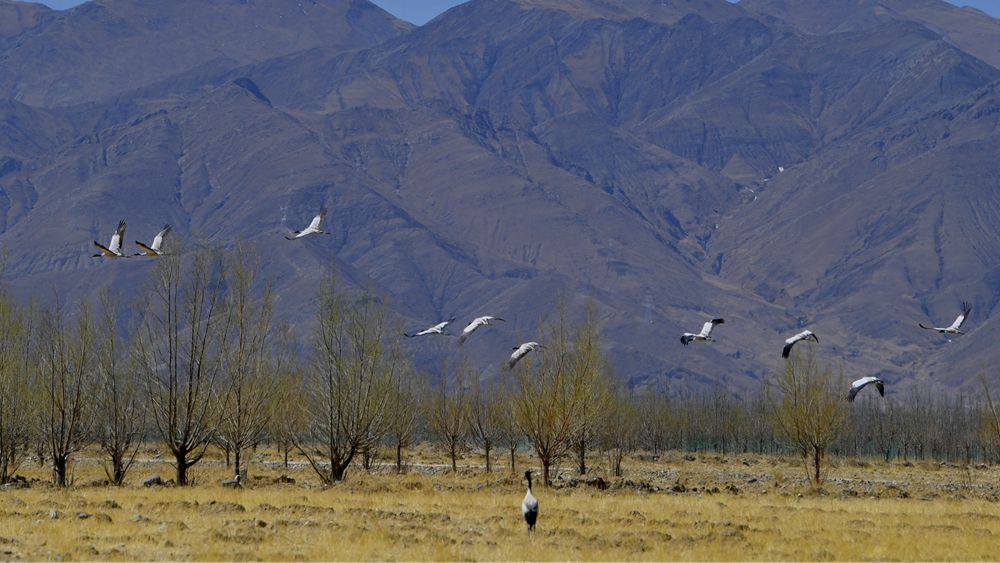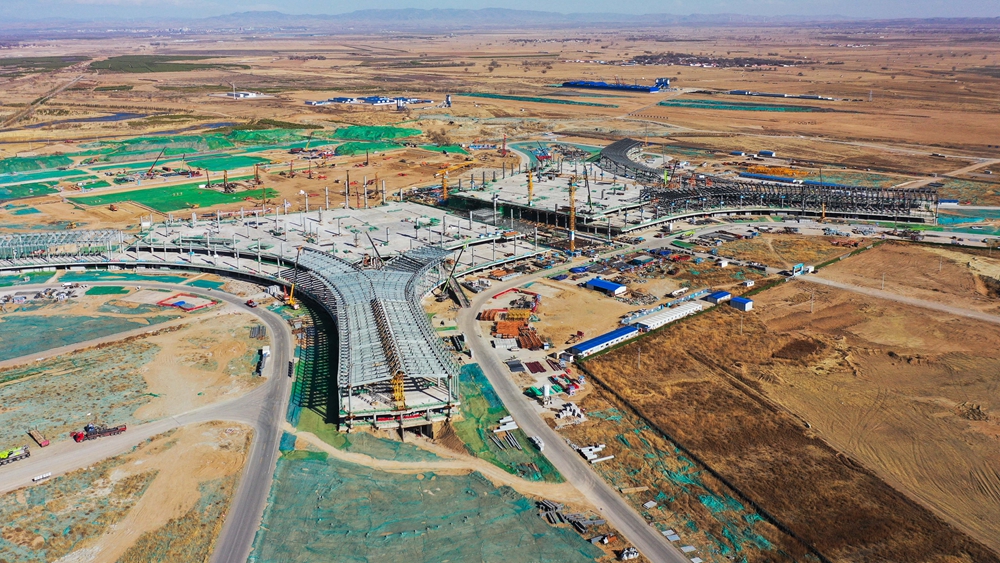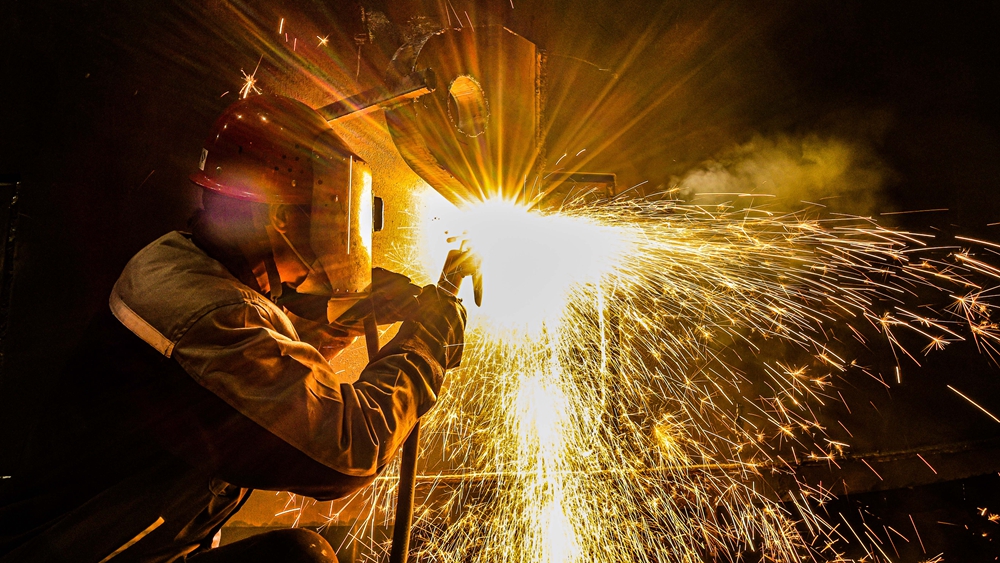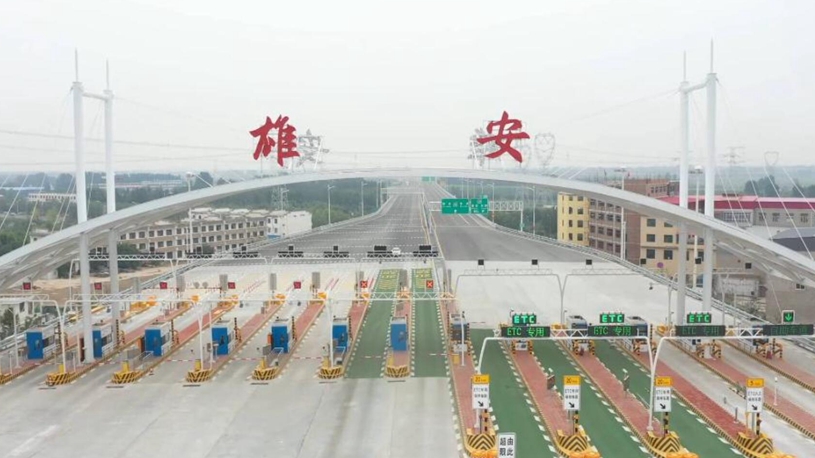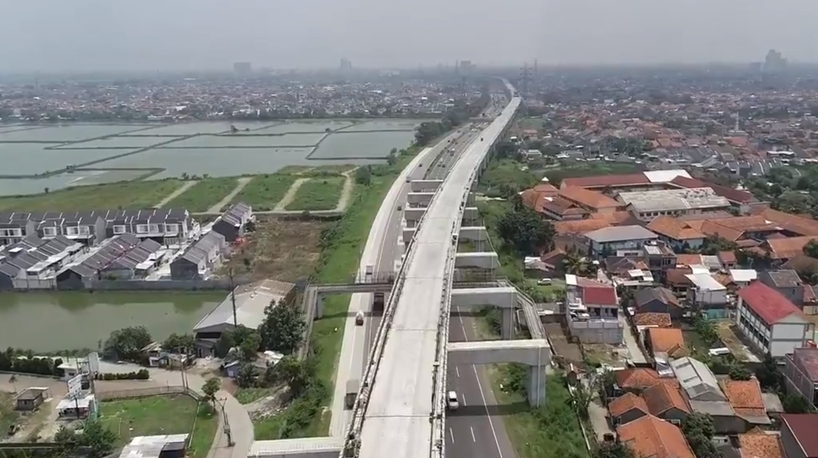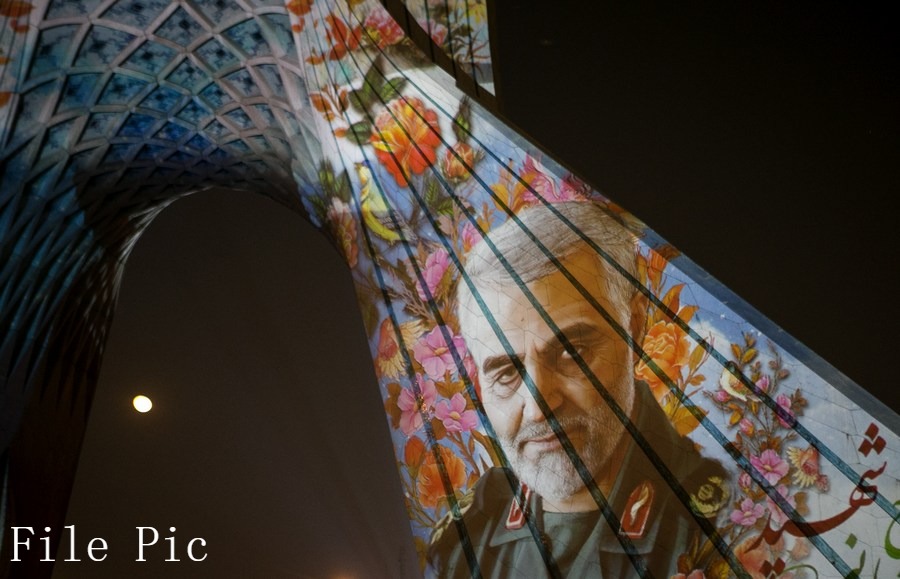
The Azadi Tower is illuminated in Tehran, Iran, on Jan. 1, 2021, during a ceremony on the occasion of first anniversary of the death of Qassem Soleimani, former commander of the Quds Force of Iran's Islamic Revolution Guards Corps (IRGC). (Photo by Ahmad Halabisaz/Xinhua)
When the painstaking talks in Vienna have supposedly entered the final stage, whether to remove Iran's IRGC from the terror blacklist is believed to be a major sticking point.
TEHRAN, April 1 (Xinhua) -- Despite the significant progress acknowledged to have been made in Vienna nuclear negotiations in recent weeks, the latest dynamics around Iran's Islamic Revolution Guards Corps (IRGC) have complicated the prospect of a final agreement in the talks aimed at salvaging the Iran nuclear deal.
Among the remaining gaps between Iran and the United States, Tehran's demand that Washington delist the IRGC as a "foreign terrorist organization (FTO)" is believed to be a major sticking point.
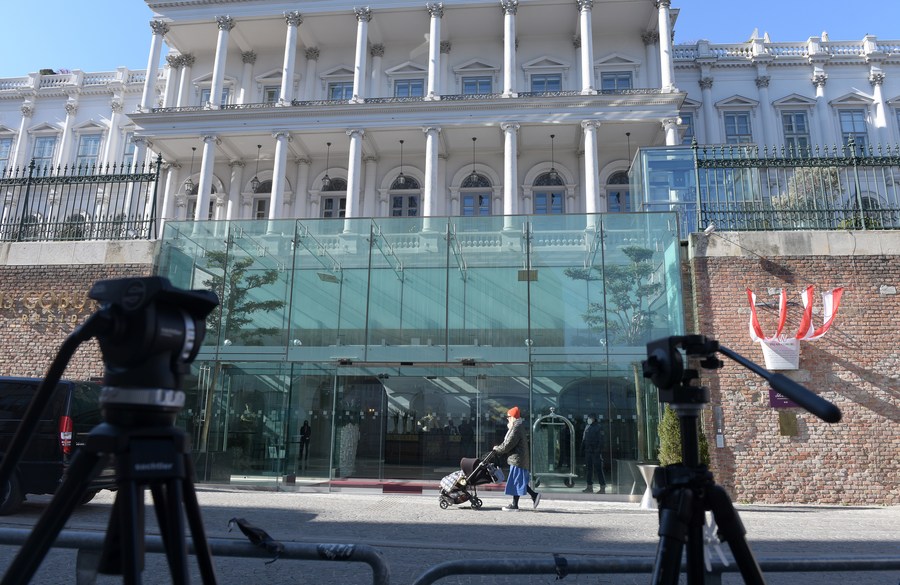
Photo taken on March 11, 2022 shows an exterior view of the Palais Coburg hotel, the venue for Iran nuclear talks, in Vienna, Austria. (Xinhua/Guo Chen)
TERROR TAG
The IRGC must be removed from the FTO blacklist, Kamal Kharazi, a senior advisor to Iran's Supreme Leader Ayatollah Ali Khamenei, said on March 27, adding Iran will not back down from efforts to secure the removal of the IRGC from the U.S. list before returning to the 2015 nuclear pact, formally known as the Joint Comprehensive Plan of Action (JCPOA).
"The IRGC is a national army, which should not be considered as a terrorist group," Kharazi told the Doha Forum, a global platform for dialogue.
The IRGC also has important economic institutions in Iran, and if it is not removed from the U.S. list, economic dividends and sanctions relief, both Iran's principal priority in Vienna, cannot be effectively ensured, analysts said.
Yet, U.S. Special Envoy for Iran Robert Malley told the same conference that the IRGC will remain sanctioned under U.S. law.
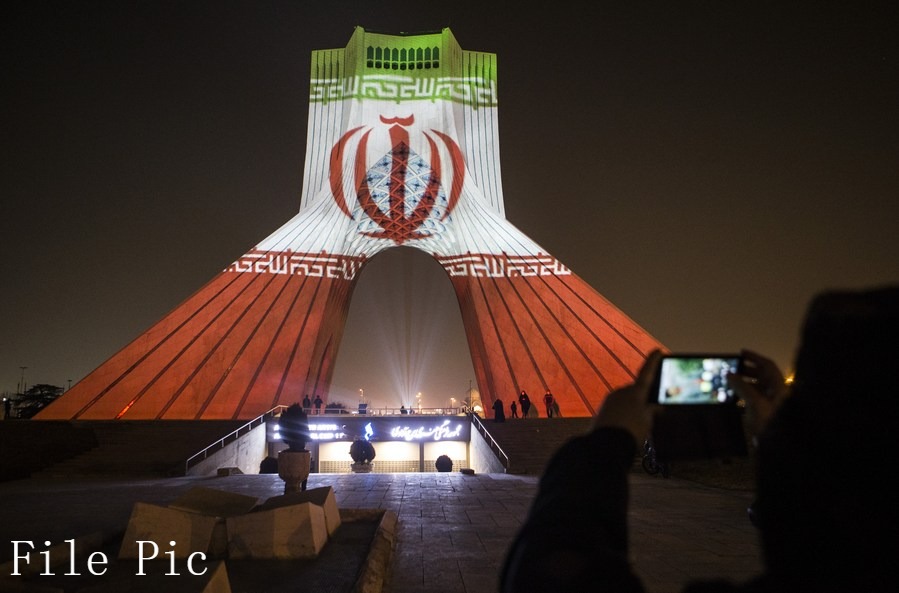
The Azadi Tower is illuminated in Tehran, Iran, on Jan. 1, 2021, during a ceremony on the occasion of first anniversary of death of Qassem Soleimani, former commander of the Quds Force of Iran's Islamic Revolution Guards Corps (IRGC). (Photo by Ahmad Halabisaz/Xinhua)
"Regardless of what happens to the IRGC issue that you raise, our view of the IRGC is that many other sanctions on the IRGC will remain. This is not a deal that intends to resolve that issue," he said.
Malley's remarks came as Israel and some U.S. Congressmen have warned against removing the IRGC from the blacklist. They, generally opposed to the possibility of a new nuclear deal with Iran, believe that delisting the IRGC would further embolden Tehran and Iran-backed militant groups in the region.
NEW SANCTIONS
The United States on Wednesday imposed sanctions on an Iranian procurement agent named Mohammad Ali Hosseini and his network of companies that Washington accuses of procuring materials for the IRGC unit responsible for the research and development of ballistic missiles.
The United States, Secretary of State Antony Blinken said, has taken this action following "Iran's recent missile attack on Erbil, Iraq, as well as missile attacks by Iranian proxies against Saudi Arabia and the United Arab Emirates."
The IRGC confirmed earlier this month that it has hit with missiles an Israeli intelligence base in Iraq's semi-autonomous Kurdish regional capital Erbil. The missiles on March 13 also reportedly landed near the U.S. consulate building in Erbil, which is new and unoccupied.
"These attacks are a reminder that Iran's development and proliferation of ballistic missiles pose a serious threat to regional and international security," Blinken noted.
In reaction, Iran's Foreign Ministry Spokesman Saeed Khatibzadeh said Washington's fresh sanction is "another demonstration of the ill will of the U.S. government toward the Iranian nation and a continuation of the failed policy of maximum pressure by that government against Iran."
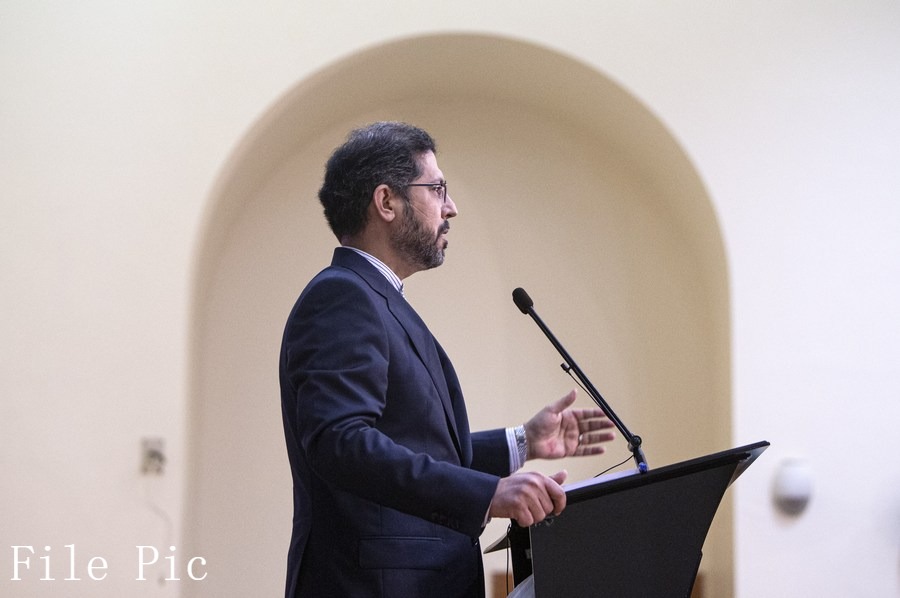
Iran's Ministry of Foreign Affairs Spokesman Saeed Khatibzadeh speaks at a press conference in Tehran, Iran, on March 8, 2021. (Photo by Ahmad Halabisaz/Xinhua)
"The United States claims to be ready to return to full implementation of its obligations under the nuclear deal, while it continues to significantly violate the UN Security Council resolution 2231," he added.
PRESSURE CAMPAIGN
Amid reports suggesting painstaking talks in Vienna have entered the final stage, Washington and Tehran have taken recent steps to exert pressure on each other within an acceptable scope, while not derailing the nuclear negotiations, Liu Lanyu, an Iran expert at the Institute for International and Area Studies of China's Tsinghua University, told Xinhua.
For instance, regarding the missile barrage near the U.S. consulate in Iraq, the IRGC said it only targeted Israel, while U.S. State Department spokesman Ned Price told reporters that Washington had no indication the attack was directed at the United States.
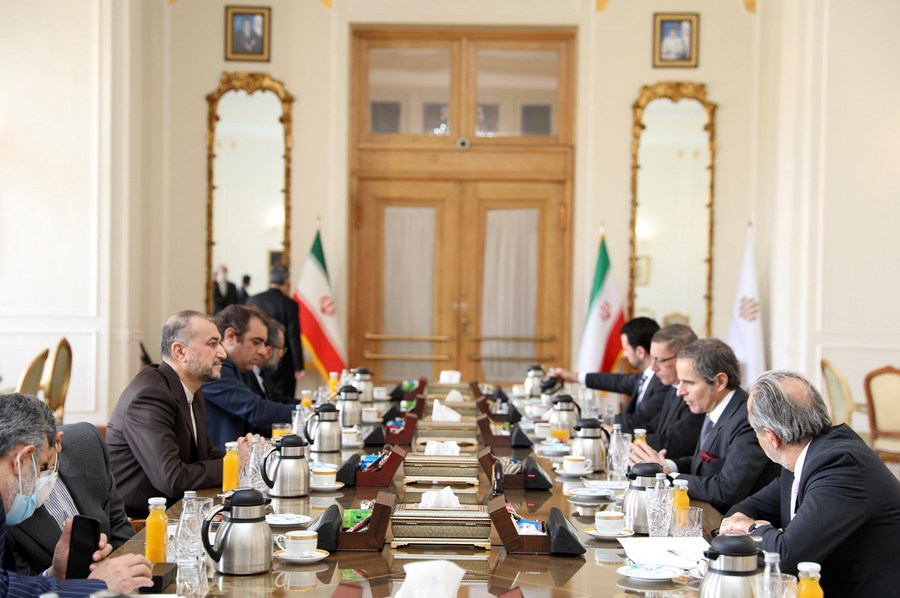
Iranian Foreign Minister Hossein Amir Abdollahian (3rd L) meets with the International Atomic Energy Agency (IAEA) Director General Rafael Grossi (2nd R) in Tehran, Iran, on March 5, 2022. (Iranian Foreign Ministry/Handout via Xinhua)
After Washington withdrew from the JCPOA and resorted to maximum pressure against Tehran in 2018, Iran's nuclear program has galloped ahead, and Iran's proxies have not subdued, Price said on Thursday.
"This was in the aftermath of the decision to abandon the JCPOA. It was in the aftermath of the decision to apply the FTO designation to the Iranian Revolutionary Guard Corps. It was in the aftermath of the killing of (IRGC commander Qassem) Soleimani," he noted.■
